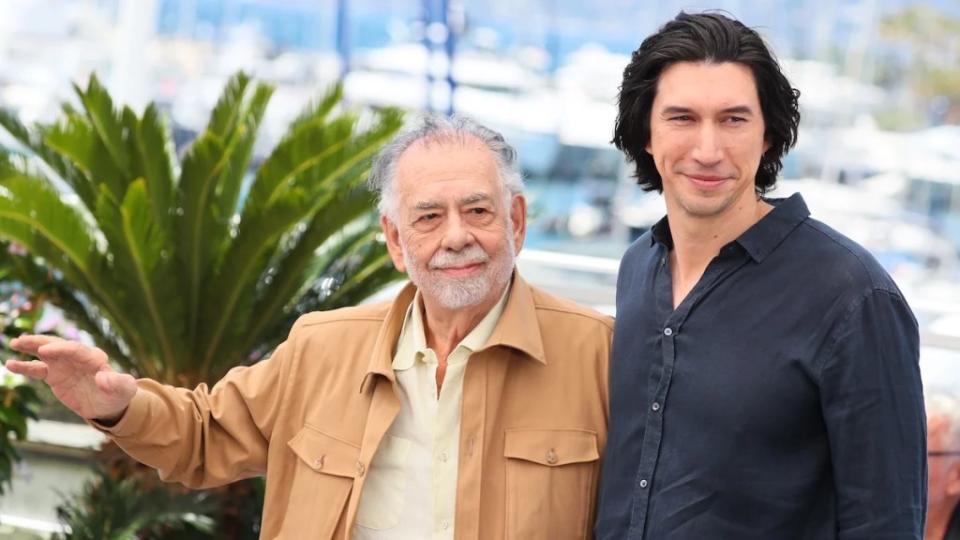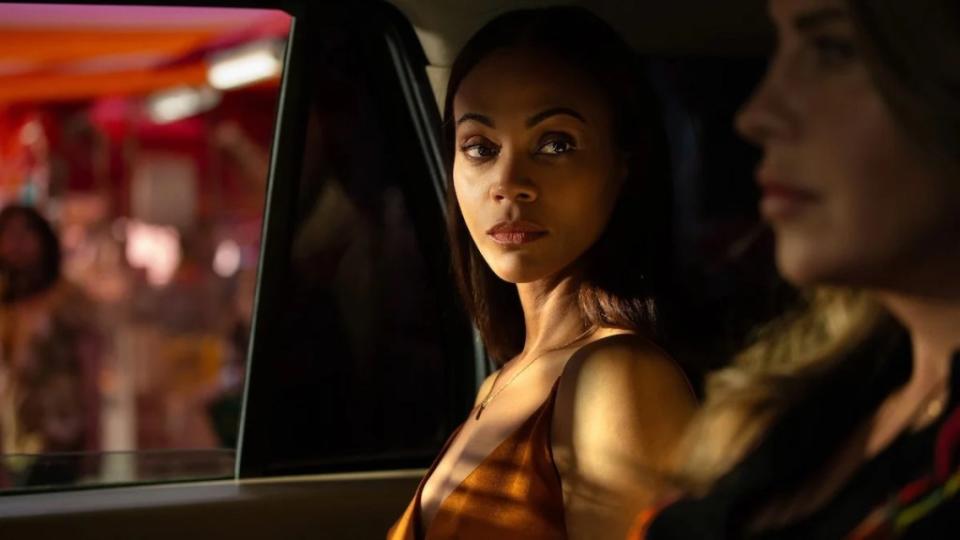Cannes So Far: Filmmakers Go Mega in a Muted Festival
There’s a trend at the Cannes Film Festival this year.
Many of the directors who’ve showcased their movies in the competition lineup have gone big, gone wild and, to borrow a prefix from Francis Ford Coppola’s “Megalopolis,” gone mega.
Many of them are films that were made during the pandemic, when production was difficult. And in many cases, the films that were conceived or made during COVID are films that people were particularly passionate about.
Perhaps it’s to be expected. When nobody knows what the movie business is going to be like in five minutes, much less five years, why not take risks? There’s not much point in playing it safe when you can’t even figure out what safe is anymore.
The early talk of the festival, of course, was Coppola’s sprawling, messy and often fascinating “Megalopolis.” The film is far from the best received competition title – as of Sunday, it ranked seventh out of the nine films scored by critics on Screen International’s “Jury Grid” chart. But “Megalopolis” is nothing if not epic, despite receiving mixed reviews, cramming decades worth of ideas into an over-the-top extravaganza that conflates modern America with the fall of the Roman Empire.

Still, it might not even be the wildest or most ambitious film at the festival. Jacques Audiard, who won the Palme d’Or in 2015 for the dark crime drama “Dheepan,” is getting buzz for another possible win this year. His new movie “Emilia Perez” caused a stir on Saturday when it debuted as a “startling and delightful” musical melodrama about a Mexican drug cartel kingpin’s gender transition “to the more benevolent woman she was always hiding from the world,” as Ben Croll put it in TheWrap.
The mostly Spanish-language movie stars Zoe Saldana as a defense lawyer who gets pulled into the world of cartel leader Manitas Del Monte, played by Karla Sofía Gascón, a trans actress offered the chance to play her character pre-and-post transition.
As Croll noted, the film constitutes “a full-blown musical, chock-full of deliriously choreographed numbers and ear-catching ditties about vaginoplasties and tracheal shaves.” And if that’s confusing, it’s because the movie is, but in a way that audiences got. Distributors were predicting that the film would be acquired before the awards ceremony.

Hit provocateur Yorgos Lanthimos, meanwhile, followed his Oscar winners “The Favourite” and “Poor Things” with a film that looked back to his dark and troubling early work, but also supersized it. You could think of his “Kinds of Kindness” as a 55-minute film about mind control, followed by a similarly lengthy piece devoted to body swapping and body horror, followed by a just-as-lengthy excursion into cult programming and reanimation; it’s two hours and 44 minutes of everything about Lanthimos that has made you squirm, and then some.
Another big premiere was George Miller’s “Furiosa: A Mad Max Saga,” which is what you’d expect from a “Mad Max” movie, but more of it: At two hours and 28 minutes, the film is almost half an hour longer than any other film in the five-movie series, and it contains the longest action sequence Miller has ever done, a whopper that took a full 78 days to shoot.
Winning stunned reactions and praise for Demi Moore, director Coralie Fargeat took her own big swing in the main competition with “The Substance,” a body horror, body swap film starring Moore and Margaret Qualley that TheWrap described as “lurid, loud and lewd.” There is a great deal of blood. Fargeat headed into her own version of territory once owned by fellow Cannes director David Cronenberg (whose film debuts Monday).

Online comments ranged from “Holy F—!” to “It’s not often I see the Cannes press screening audience lose their s— like this.”
There’s been “a lot of swinging for the fences this year,” said one veteran indie-film executive on Sunday afternoon. “And some of it has even worked.”
Meanwhile, Kevin Costner’s “Horizon: An American Saga” isn’t just a three-hour movie about the expansion of the American West, it’s a three-hour movie that is Part One of four separate films, the second of which will also be released this summer and the third and fourth of which are in pre-production.

Even Andrea Arnold, the U.K.’s indie queen of hardscrabble working-class stories, has embraced a bit of magical realism in “Bird,” in which a couple of the characters seem to turn into animals.
Over in the Un Certain Regard section devoted to newer filmmakers, Halfdan Ullmann Tøndel (grandson of legendary actress Liv Ullman) turned heads with “Armand,” which starts as if it’s going to be a film built around simple conversations in rooms but then goes off kilter with an astonishing sequence that finds actress Renate Reinsve (“The Worst Person in the World”) collapsing into laughter for minutes on end. It’s as much a riotous tour de force as any “Furiosa” action sequence, and it’s followed shortly by another completely bizarre and transfixing dance scene in a school hallway.
Sure, Cannes has showcased its share of straightforward and even understated films; not everything has been wacky. Indeed, this year’s festival, the fourth since the COVID-19 pandemic caused the cancellation of the 2020 festival and postponement of 2021, and the first since last year’s actors and writers strikes, in many ways still feels muted. It has less of a presence from American films and has led to fewer deals of any significance.
Here at the de facto midway point, no film has grabbed the imagination the way works like “Anatomy of a Fall” or “The Zone of Interest” did last year, or “Triangle of Sadness” the year before.
As one leading American director put it to me, Cannes feels like it’s “part of the way back.”
But even if the lineup contains fewer Cannes smashes, there have been bold films to be found everywhere, with notable titles including “The Girl With the Needle,” “On Becoming a Guinea Fowl,” “Blue Sun Palace,” “The Shameless,” “The Balconettes” and many more.
Heck, even the Directors Fortnight title “Eephus,” the quietest imaginable indie, ends with a long sequence of guys playing baseball in the pitch dark that somehow calls up memories of Tony Scott’s 1996 thriller “The Fan” with Robert De Niro and Wesley Snipes, which ended with a sequence of baseball being played in the pouring rain. When a Richard Linklater-style indie starts reminding you of a Tony Scott extravaganza, there’s something in the air.
And to all appearances, there’s more to come. Monday’s two competition titles have the potential to be shockers. One is Cronenberg’s “The Shrouds,” which finds Vincent Cassell playing a character based on Cronenberg, who creates tombstones that allow you to view your deceased relative’s body as it decomposes. (Corpse and other roles played by Diane Kruger.)
The other is from the uncompromising Iranian-Danish director Ali Abbasi, who made waves in Cannes with the 2018 “troll sex” movie “Border” and the searing 2022 drama “Holy Spider.” He’s back with “The Apprentice,” about the relationship between a young Donald Trump (Sebastian Stan) and his mentor in corruption, lawyer Roy Cohn (Jeremy Strong).
After that, we’ll have another lush extravagance from Paolo Sorrentino (“Parthenope”) as well as films by Mohammad Rasoulof, who just escaped from Iran after being sentenced to flogging and prison (“The Seed of the Sacred Fig”).
A muted Cannes? Maybe. But a pretty wild and bold Cannes, too.
The post Cannes So Far: Filmmakers Go Mega in a Muted Festival appeared first on TheWrap.


